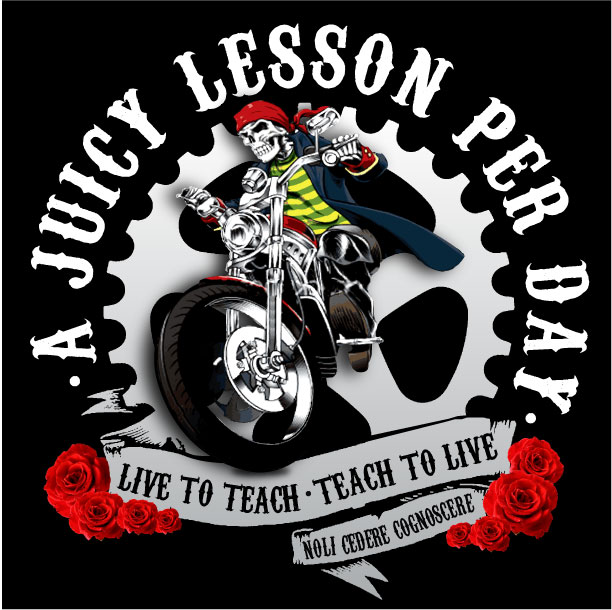Our JuicyLesson kicks off today with Sir Elton John’s rendition of the tune “Teacher I Need You” from the album “Don’t Shoot Me, I’m Only the Piano Player”.
Work hard and long and you will be rewarded … and hopefully not by your principal, Wisenthal, calling you a ” work-a-holic” which was what she called me at one point in our rapidly-downward spiralling relationship, not, however, when Shoshana Fleischer and I were running the after-school homework programme. Then we probably couldn’t have worked hard enough for her.
For those two great years and then for one that I ran the programme solo after Shoshana left for greener pastures, I worked my butt off. Part of my job, as I saw it, was to regularly issue reports on my trusty word processor and on my trademark 8 1/2 x 14 legal size paper which outlined anything that I felt required mentioning from the previous day’s session, as well as various comments and suggestions regarding different homework programme participants.
Elaine, then vice-principal, alluded to these reports on a number of occasions and seemed very much impressed by the fact that these reports existed at all, let alone by their content. She didn’t denigrate what I was doing then in terms of my being a “workaholic” I guess because it suited her purpose – first by justifying her choice of Shoshana and myself to administer the programme which was a big job and a heavy responsibility, and second to rationalize the fact that Fleischer and I were making ten grand each per year as well as paying teacher supervisors to scale, roughly $70/hr. (Not to mention remunerating student helpers to the tune 20 bucks an hour, I believe it was.)
Were the financial resources expended on the homework programme excessive? I can’t say but what I can say is that Fleischer and I earned every penny we made. Given the results (see below), it was money well spent, as they say.
I do not have any data on hand to prove it, but I recall, vaguely, and this was years ago, that participants in what was affectionately christened by the students in it as the “homework club” saw their respective performances in school improve, maybe not by a lot, but at least the kids were learning what to do to be successful and, more importantly, they were becoming aware of the fact that they could be successful if they really put their minds to it.
More than your share of under-achievers have established that reputation for themselves in the eyes of their parents, their teachers, and even among some of their siblings and peers and therefore have absolved themselves from putting out the effort that is required of any student if that student – no matter who they are or what their potential is – wants to be, and I really don’t like using cliches because they somehow minimize the impact of the message I am delivering … yup, I am right now swimming through the haze in my mind to try to discover where I am in this narrative, oh yeah, I was just talking about what a student has to do and here comes the cliche, to be the best that he or she can be.
All I ever asked of my students is to be just that, the best that they can be. Why did I ask that and only that of them? It’s because I know that if students get the message and decide that they, who have yet to really apply themselves in their school careers to whatever point, will really change their ways and re-double their efforts as it were to at least try to become the best that they can be, if they grab on to this message and make a point of really trying in school, then the teacher and student both win.
This is due to the fact that this student, who I said had yet to really apply himself even though he was already 15 years old and entering Sec. 4, was finally actually expending effort – attacking homework seriously, being attentive in class, and studying for exams – thus fulfilling as well the teacher’s primary goal, that is that each kid do his best work most, if not all, of the time.
It was important for me as a teacher to find out, and as fast as possible, who the strong students were and to identify too those students who would have to work extra hard to be successful. If, for example, a student whom I had identified as highly capable was pulling test marks in the low seventies, it was relatively easy to figure out why. This kid, who had proven himself to be highly capable, was simply not expending the necessary effort, not studying adequately if at all for tests and exams for example, and/or just not trying to maximize his or her potential.
This particular challenge would be dealt with in the following manner:. teacher simply has a word with the culprit, obviously in private, pushing all the right buttons and, hopefully, none of the wrong ones. A good relationship with your students goes a long way to ensuring that your little pep talk will be successful at least to the point that these previous “under-achievers” make the effort, enfin, to shuck that label for good.
More than a few of the under-achieving type of student have never really tried, I mean really studied for a test like I did in grade 8, first year of high school in those days. I still remember – and I’m talking about an event which occurred in 1962, more than fifty years ago F.C.S., when I studied for four straight hours without a break, in preparation for my December exam in General Science. I pretty well memorised everything, one-and-a-half to two hard-covered McGill Notebooks. Remember them?
Don’t remember how I did on the above mentioned exam but I do recall studying from 8 to noon on a Saturday morning, figuring that if I got my studying for the day done early, then I would be able to play in the afternoon before hitting the books between the time supper finished and 8:30, when the Canadiens came on television in those days. The game actually started at 8:00 but the CBC feed only began at 8:30. While I was studying, I was wondering by how many the goals “Nos Glorieux” would be ahead by the time the game came on, which it usually did with seven or eight minutes remaining in the first period.
We just said that we have a conversation with the “under-achievers”, those who are not working to potential not because of a learning disability or some other challenge but because they’re not trying their best to do so. Alternately, how does the teacher handle under-performing students who are not doing well because they are having difficulty mastering and applying concepts, for instance, or because they are experiencing tremendous hardship when attempting to assimilate course material into a frame of reference to which this student can relate?
Simple. We build these students up, telling them that they can be successful with the appropriate approach to their work. By developing in these students a degree of self-confidence they never before possessed, the teacher, working in tandem with parents, the guidance department, etc. will likely do wonders for how these students perceive themselves, how they feel about themselves in other words. “I like Jerry because he has a way of making me feel good about myself.”** That’s most of the battle won, right there.
**A comment made by a returning Phoenix student, John, in the essay that all candidates have to write so that their English (and French) skills can be assessed.
For by getting the student to believe he can do it, we are in fact improving the student’s potential to actually achieve success. When a particular student starts to improve and begins pulling better marks, you make sure that his class mates know it as well, by putting this kid’s test paper with the mark clearly visible for any one to see, on top of the pile, for instance.
Little things like writing encouraging comments on an assignment, something like “Another piece of high quality work from a capable and conscientious student” can be of enormous help in making the student feel better about her/himself, thereby putting you both on the right track, the one leading to success.
Below: A Ghanaian fan during Ghana’s 2-1 loss to the Americans at the World Cup Finals tournament in Brazil.

Peace.






